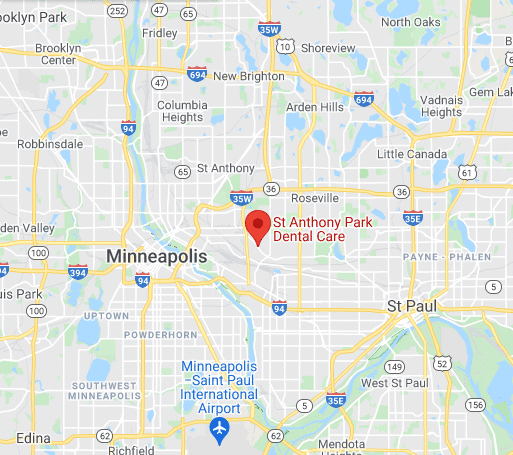Are you having dental issues? If so, you are probably looking for a dentist in St. Paul, MN, or in the general vicinity. That’s where we come in. Here at St. Anthony Park Dental Care, we can talk with you and perform a dental exam to confirm whether you have a TMJ/TMD issue.
But first, let’s go over what is the difference between TMJ and TMD. Many people think they are the same thing, but they’re not.
What Is TMJ?
TMJ is short for temporomandibular joint. This is the small joint that connects your jaw to your skull. You use this little joint continually throughout the day as you talk, eat, swallow, and yawn. Therefore, if you have TMJ, just about everything you do during the day can restrict your jaw movement and be extremely painful.
What Is TMD?
TMD is short for the temporomandibular joint disorder. TMD is the term that covers any given number of issues that cause TMJ. So TMD is a general term that covers a variety of dental issues and TMJ is the dental issue that’s associated with the joint that connects your jaw to your skull.
What Are the Symptoms of TMD?
TMD has many symptoms. If you have TMD, you might experience some or all the following symptoms.
- Jaw and facial pain
- Stuffiness or ringing in your ears
- Neck aches or headaches
- A clicking or popping sound when you move your jaw
- Jaw area muscle spasms
- Swelling on the sides of your face
- Jaw alignment shift in the top and bottom teeth
- A locked jaw or limited opening of your mouth
How Common Is TMD?
TMD affects up to 15 percent of all adults. So, about one out of every 12 people in the U.S. experience TMD. However, there are probably more than that since TMD frequently goes undiagnosed.
What Causes TMD?
TMD is usually caused by stress and/or excessive strain to the joints in your jaws along with the muscles that are associated with talking, chewing, and swallowing. The most common habit that causes TMD is the involuntary grinding or clenching of a person’s teeth. However, TMD can also be the result of head, neck, or jaw trauma, or arthritis in the TMJ.
How Does a Dentist Diagnose a TMD Disorder?
A dentist in St. Paul, MN will perform a variety of tests to diagnose TMJ or other TMD disorders. He or she will use their fingers while applying a slight amount of pressure to your jaw to check for tenderness or pain. Then he or she will examine the insides of your mouth for any signs of teeth clenching, grinding, or alignment issues. And lastly, if he or she finds evidence of TMD they will have some X-Rays done on your mouth and jaw.
Can TMD Be Treated at Home?
Yes, sometimes. If you don’t have an extreme TMD problem, you can try the following to help ease your TMD symptoms.
- Concentrate on keeping your face relaxed. Repeat to yourself “lips together, teeth apart.”
- Avoid grinding your teeth or constantly chewing gum.
- Try to chew on both sides of your mouth versus just one side.
- Don’t rest your chin on your hand or your phone between your shoulder and your face.
- Use good posture. Sit with your head up, your back straight, and shoulders squared.
How Does a Dentist Treat TMD?
Your dentist might prescribe a high-dose anti-inflammatory to help ease the pain and swelling. He or she might also prescribe a muscle relaxer to relax your jaw if you excessively grind your teeth. You might also be prescribed anti-anxiety medication to help relieve stress which tends to bring on TMD.
A dentist might also have you wear a splint or nightguard. These are plastic mouthpieces that are placed over your upper and lower teeth to prevent them from touching. A splint or nightguard will reduce the effects of teeth grinding and clenching while helping to correct your bite. Splints and night guards will therefore help put your teeth into the correct position.
Other TMD dental treatment options include corrective dental work, transcutaneous electrical nerve stimulation, ultrasound, low-level laser therapy, radio wave therapy, or trigger-point injections.
When to See a Dentist?
You should see a dentist at least twice a year and/or any time you have a potential dental issue. There is no reason to live with the pain of something that can be easily treated or with the stress of not knowing. So, make an appointment with your St. Paul, MN dentist or St. Anthony Park Dental Care today.


